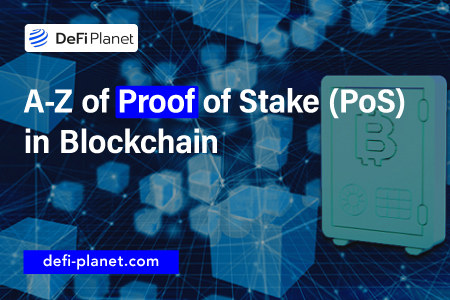Last updated on July 13th, 2023 at 04:14 pm
What is Proof of Stake?
The first generation of blockchains used the Proof of Work consensus mechanism, which is currently being used by Bitcoin. Proof of Stake was created to solve the issues noticed in the forerunner of blockchain like the complex validation process, which consumed a massive amount of energy.
Validators take the position of miners in a PoS chain, validating the transactions and building blocks in the process. Doing this helps to improve the operations and security of the network. For their effort, they are rewarded with new tokens.
How Is Proof Of Stake Implemented?
Proof of Stake depends on validators for verifying transactions and building blocks. Generally, the validator chosen is dependent on different factors like the number of tokens in their pool, staking age, and so on. Though many networks offer a higher opportunity to those validators with larger tokens in their pools to be chosen, there are some checks and balances incorporated to prevent centralization. They may employ a pseudo-randomized selection process to achieve this.
In a PoS system, different rules and strategies are added to prevent validators from misusing their power. Sometimes, a committee of validators may be chosen to validate a transaction randomly, and they may not know each other. For networks that use this, the only time that the validators know others in the committee is after the validation process has ended.
Some networks instill penalties on those validators that flout rules or misbehave. They may lose a certain amount of their stake or even end up being banned entirely.
Why is Proof of Stake Important?
Proof of Stake possesses more features than its counterpart, PoW. It is environmentally friendly and doesn’t increase the carbon footprint of the world greatly. Since it uses staking to validate its transactions, mining is not needed. It removes the need for mining farms and large computing power. Secondly, PoS is highly flexible compared to PoW, making it easy for developers to work in a highly scalable and adaptive environment.
Ethereum is moving from PoW to PoS to improve its user experience for community members while curbing down on the energy that it consumes to operate.
According to Ethereum, the following are reasons PoS is important, which goes to show why they are making the switch.
“• Better energy efficiency – you don’t need to use lots of energy mining blocks
- Lower barriers to entry, reduced hardware requirements – you don’t need elite hardware to stand a chance of creating new blocks
- Stronger immunity to centralization – proof-of-stake should lead to more nodes in the network
- Stronger support for shard chains – a key upgrade in scaling the Ethereum network”
In Proof-of-stake, Is Pooling Possible?
Pooling is possible in Proof of Stake chains, and it increases the chances that a validator will be picked to validate the transaction and create a block. It improves their chances of being rewarded by the platform for validation.
In a typical PoS chain, a validator with a higher amount of tokens has a higher chance of being selected to validate, though this may not be the case in all networks that use this consensus system. Some have incorporated a randomizing feature to reduce the risk of centralization. In a PoW chain, pooling improves the computing power that a mining pool has, thereby improving its chance of solving complex mathematical puzzles faster than others. On the other hand, the number of tokens a pool has in a PoS platform increases the chance of it being chosen because the system feels that a validator with a massive amount of tokens has a lot to lose and benefit from the operations of the platform.
Will Proof-of-stake Allow Users To Mine From Their Phone?
Mining a Proof of Stake token on one’s phone may be feasible because the holder doesn’t need a high level of energy, unlike PoW. At the moment, mining PoW coins like Bitcoin is impossible because of the computing and high technology needed to pull the activity.
Staking, on the other hand, is delegating the tokens to a validator or the owner of a node. Token holders can choose the validator they want to delegate their tokens to, based on different criteria that they may be considering.
Many wallets like Trust Wallet, allow their users to stake their tokens within the platform and earn rewards in return. Some of the tokens that can be staked at the moment on Trust Wallet are:
- Binance Coin (BNB)
- TRON (TRX)
- Tezos (XTZ)
- Cosmos (ATOM)
- VeChain (VET)
- Callisto (CLO)
- Kava (KAVA)
- TomoChain (TOMO)
- IoTeX (IOTX)
- Algorand (ALGO)
Is BNB Proof of Stake?
Yes, it is. When Binance Coin- BNB- was created initially, it was based on the ERC20 standard and resident on the Ethereum blockchain. It later moved to its own blockchain. As a Proof of Stake coin, holders are allowed to stake their BNB tokens through different platforms including crypto wallets like Trust Wallet.
Is Proof Of Stake (PoS) The Future Of Cryptocurrency?
Environmental groups have faulted the Proof of Work concept because of the way it degrades the environment. Studies have been done to research the impact of this principle on the environment.
Susanne Köhler and Massimo Pizzol, Aalborg University’s researchers, in 2019, carried out a study on the effect of Bitcoin mining on the environment, and they noticed that the carbon footprint of this activity was 17.29 metric tons. It is important to note that this was done before the astronomical rise in the value of Bitcoin, meaning that the number of those mining has increased.
Another report released by the Cambridge Centre for Alternative Finance shows that mining Bitcoin globally consumes more energy than both Greece and Austria. These are two of the many studies concerning the negative effects of PoW chains.
A Proof of Stake blockchain does not need mining activity to validate transactions or mint new tokens. This is already taken care of by staking. At the moment, Proof of Stake solves the issues in the first generation of blockchains, meaning that it will be around for a long time.
What Are The Most Popular Proof-of-Stake Cryptocurrencies?
At the moment, new generation cryptocurrencies like Algorand and Cardano are opting for PoS as their consensus mechanism because of different reasons like high scalability, reduced energy consumption, flexibility and much more.
According to Coinmarketcap, as at the time of writing this, the top PoS coins using market capitalization as the criterion are:
- Cardano
- Tezos
- Algorand
- Celo
- Mina
- Bitshares
Can The BTC Protocol Be Based On Proof Of Stake?
Ethereum is currently working on its move from the PoW to PoS chain, meaning that it would give up mining for staking activities. When this occurs, ETH 2.0 will be birthed, though there is no specific date for this. This move is happening because of different reasons.
Firstly, environmental groups have increased their cries for better and more sustainable blockchains. The massive consumption of energy that PoW chains need for their mining process is affecting the earth negatively.
Secondly, scalability issues have plagued Ethereum for a while, and that’s why alternatives like Cardano, Polygon, and the likes are embraced. Such an important issue has to be nipped in the bud, and a move could do this.
Many feel that Bitcoin could do the same if ETH 2.0 becomes a reality. Once Ethereum embraces PoS, the likes of the founder of Swiss crypto broker, Bitcoin Suisse believes that Bitcoin will switch.
Why Does Proof-of-stake Invite Centralization?
Proof of Stake consensus mechanism tends to favor those with a higher number of tokens compared to others. Before a coin holder can become a validator, they are expected to hold a specified amount of native tokens, which is usually massive. This means that only those with large amounts of tokens can verify transactions, which may indirectly usher in centralization.
Though many cryptos may claim to be decentralized or aiming to be a DAO, some of their practices still scream for centralization. In a typical PoS network, before decisions are made, a voting session is initiated. Every token holder is allowed to vote based on the number of native tokens they hold, meaning that those with large numbers have a higher say than their counterparts. Since these tokens are not uniformly distributed, it means that only a selected few decide what happens within the platform. They can submit proposals on intending changes and vote on them with their large token numbers.
If more features to curb these are not introduced, the risk of centralization may become greater daily.
Why doesn’t delegated proof of stake work?
DPoS is a variation of the PoS, but in this case, it leaves a great deal of decision makers to users. They can alter the transaction sizes, fee schedules, and much more. Delegates or witnesses that validate transactions and create blocks are chosen by the users.
Before a DPoS network can function effectively and be highly decentralized, it needs a vast set of delegates to choose reputable witnesses, which may not always be possible.
Secondly, since the number of witnesses is not as many as in a PoS network, it could lead to them conniving and introducing centralization tendencies.
Thirdly, those with smaller wallet sizes may decide to boycott the votes because the votes of those with a large number of tokens outweigh theirs.
Problems Associated With Using PoS In Crypto/Blockchain
Though Proof of Stake blockchains are touted as being better than their counterpart, PoW because they do not use large computing energy and may not deplete the environment as Proof of Work networks, they still have some issues that will be discussed below.
Penalties To Validators
Validators are important participants in a PoS network, meaning that their roles are crucial to the functioning of the platform. Their nodes have to function every time, and once this doesn’t happen, they are penalized. Running a node on a network comes with its rewards and possible drawbacks.
Centralization risk
As earlier mentioned, the risk of centralization is possible in this type of chain because the team behind a PoS project can decide to earmark a large percent of the supply of the tokens to themselves, possessing the needed upper hand. In a typical decentralized PoS platform, the users with the highest number of tokens can decide what happens in the ecosystems. They can vote on the changes and submit proposals that favor them. In the aspect of validating transactions, those community members with a large number of the native tokens can vote themselves in as validators, giving them unnecessary power. To prevent the core element of decentralization from being bastardized, it is important that PoS networks create features to promote egalitarianism.
Liquidity Issues
When a crypto investor stakes a coin that has little or no liquidity, it could turn into a sour situation. Some possible outcomes that may occur to such a trader are:
- The trader may be unable to convert the crypto into a major coin.
- Selling the coin may be a difficult feat for the crypto enthusiast.
Price Movement Risk
Staking is common in PoS networks to improve the security of the platform and approve transactions. A risk that stakers face in this staking process is the risk of adverse movement in prices. There is an erroneous belief that staking is a loss-free exercise, which may not be entirely true. It is advisable to consider more than APY when choosing a Proof of Stake coin to stake.
Nothing at Stake issue
There is the concern of validators carrying out malicious activities that could affect the platform negatively. This could lead to the Nothing at Stake issue. In chains that use miners, an issue like this is handled with the high mining cost that they incur. A miner will likely not carry out malicious attacks because of the number of funds that they have sunk into their mining process.
On the other hand, validators do not need mining rigs or large computing power. To prevent validators from gaming the system, it is important that incentives and penalties be added to the ecosystem.
In Conclusion…
Proof of Stake chains seems to be better than PoW because of:
- lower computing power
- environmentally friendly
- easier to gain access.
Though it might have its perks, some risks are inherent in its operations like:
- Nothing at stake risk
- Price movement risk
- Centralization risk and much more.
And for transactions to be verified in a PoS, validators are necessary. Security of a PoS chain is achieved through staking.
If you would like to read more interesting case studies like this, follow DeFi Planet on Twitter and LinkedIn.























